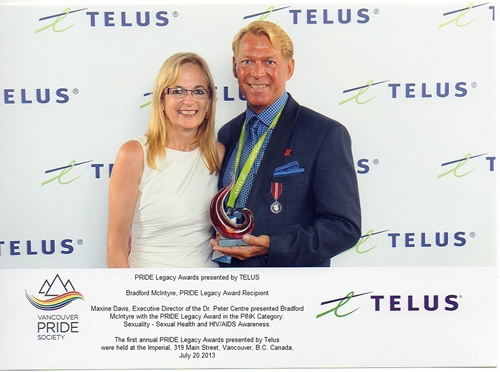
|
LIVING WITH AIDS:
THEN AND NOW
August 2014 - Anthropologists can learn what it’s like to live with HIV/AIDS by applying the experiential approach of anthropology, which studies biological, psychological, and social dimensions of health to better understand what it means to have a disease or illness. Being diagnosed with HIV/AIDS is a completely life changing experience. To analyze a person’s experience with an illness or disease, anthropologists study illness narratives, or the stories that people tell about their illness. The story of Bradford McIntyre can be examined in this way to help understand the disease better. The abstract of an illness narrative is an overview of a person’s story. Bradford is a homosexual man and was diagnosed with AIDS on November 28th, 1985.
This was at the height of the HIV/AIDS epidemic, and his doctor told him he has 6 months to live. After he passed the 6 month mark, his doctor told him he had 18 months to 2 years to live. Believing that he didn’t have much time, he quit his job as a hairstylist; left his friends and family, and moved to Ottawa, Canada where no one would know him. Bradford has lived with AIDS throughout all the change that has happened since the 1980s (socially and biomedically), which created many dramatic ups and downs in his life. This caused him a great deal of anxiety and emotional stress throughout the years. However, he says that over time he has practiced and learned to be healthy emotionally, which has actually helped him heal physically. He has educated himself about alternative therapies and has done a lot of work to raise awareness of these effective treatments.
Living in Canada, a Western country, and working as a hairstylist at the age of 30 describes the orientation of his narrative. During that time, the symptoms of HIV/AIDS were visible, and not much was known about the disease, making it extremely scary. For years after his diagnosis, Bradford lived in constant fear for his life. Early treatments for HIV/AIDS had many complications and severe side effects, and he felt hopeless. This would describe the complicating action of his narrative. However, four years after his diagnosis, he decided to stop living in fear and move on with his life. He found that being mentally healthy had a huge impact on his physical health, and started to focus on love and positivity. This would describe the evaluation of his narrative. After living with the disease for 28 years, he has become a huge advocate for HIV/AIDS awareness in Canada. He is healthy, happy and very passionate about the cause. This would describe the result and coda of his narrative.
Below is a picture of Bradford receiving the PRIDE Legacy Award in 2013 for his involvement in the HIV/AIDS movement.

Sources:
Das, Moupali. "Prevention of HIV Acquisition: Behavioral, Biomedical, and Other Interventions." Medscape. January 1, 2012. Accessed August 12, 2014. http://www.medscape.org/viewarticle/766250.
McIntyre, Bradford. "Bradford McIntyre Recieves PRIDE Legacy Award." Bradford McIntyre Recieves PRIDE Legacy Award. Accessed August 12, 2014.
Source:https://anp204-mehtana2.weebly.com/experiential.html
For more HIV and AIDS News visit...
Positively Positive - Living with HIV/AIDS:
HIV/AIDS News
|